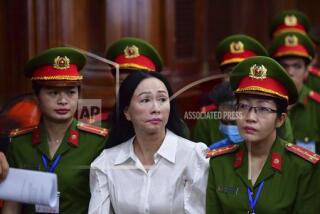Pol Pot by Any Other Name
- Share via
SIEM REAP, Cambodia — Just about the time that the White House announced plans for an investigation into faulty Iraq intelligence, my Cambodian friend Phead took me to visit one of the monuments to the victims of his nation’s genocide. On the way to see the collection of human bones and skulls gathered from the killing fields of the Khmer Rouge, I asked Phead what he thought about the U.S.-led war in Iraq.
Phead, like other survivors of this country’s almost incomprehensible tragedy, has plenty of reason to abhor war -- and to resent and distrust the United States. After all, Washington’s Vietnam adventure provided the ferment for the Cambodian civil war that in the 1970s propelled to power the deranged regime of Pol Pot.
The U.S. had carpet-bombed Cambodia in an effort to root out Vietnamese fighters and their supply lines. By some accounts, the bombings killed more than 200,000 villagers. To this day, the scattering of unexploded American ordnance -- along with millions of land mines left by an assortment of armies -- continues to take limbs and lives.
In this atmosphere of chaos Pol Pot came to power, and in less than four years the Paris-educated leader and his followers pursued a Maoist utopia that pushed this country into a nightmare of terror, hunger and death. Other countries contributed to decades of bloodshed in Cambodia, but the main culprit was the demented Pol Pot and his Khmer Rouge followers.
Before it was overthrown by Vietnamese forces, the Khmer Rouge sent as many as one-quarter of all Cambodians to their deaths.
After living through the horrors and losing five family members, Phead had no hesitation in assessing the Iraq campaign. He did not mention weapons of mass destruction, oil or corporate profits. He didn’t even mention democracy. He summed it up in one sentence: “Saddam Hussein is like Pol Pot.” The U.S., he said, was right to attack.
The Cambodian people understand better than most the suffering that war entails and what it means to live under a ruthless dictatorship. The war in Iraq is nowhere near the top of their concerns. But every one of the Cambodians I asked who knew about Iraq gave me a response nearly identical to Phead’s: A man like Pol Pot must be removed from power.
But the world allowed Pol Pot to remain in power for years. He was never captured and died a free man in 1998. Even after he was overthrown, the U.S. and other powerful nations refused to accept the new government installed by the communist Vietnamese, insisting that the Khmer Rouge represented Cambodia at the United Nations. That was the twisted logic of Cold War politics.
Vietnam intervened only after repeated cross-border provocations from Pol Pot’s forces. Unlike Iraq, Cambodia had little to offer a potential foreign “liberator.” The only reason to stop the killing would have been, well, to stop the killing.
Stopping the killing in Iraq has now become the argument of choice for defenders of that war. Politicians and historians will continue to debate the true reasons behind Washington’s decision to target Hussein’s regime. Standing in Cambodia’s killing fields, what seems inexcusable is doing nothing to stop genocide.
The U.S. track record on stopping mass murders remains unimpressive. The U.S. -- and the rest of the world -- has looked the other way while hundreds of thousands were killed, most recently in places like Rwanda and Sudan.
The experience of Cambodia -- and Iraq -- points to the need for a clear policy spelling out what is to be done when a twisted dictator sets out to destroy his own people.
At the humble memorial for Pol Pot’s victims, saffron-robed Buddhist monks ask foreign visitors for donations, with a small sign gently reminding outsiders that “the world stood by” while the slaughter went on.
If stopping mass murder was the reason for going to war in Iraq, it should be reason enough for overthrowing other genocidal regimes. It would have been more than reason enough in Cambodia.
More to Read
Sign up for Essential California
The most important California stories and recommendations in your inbox every morning.
You may occasionally receive promotional content from the Los Angeles Times.












